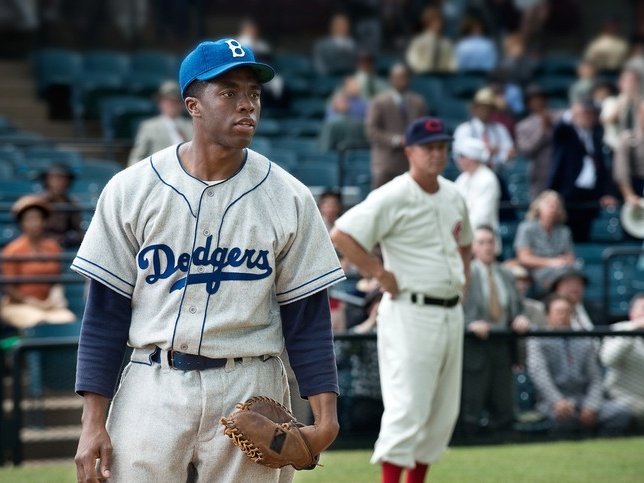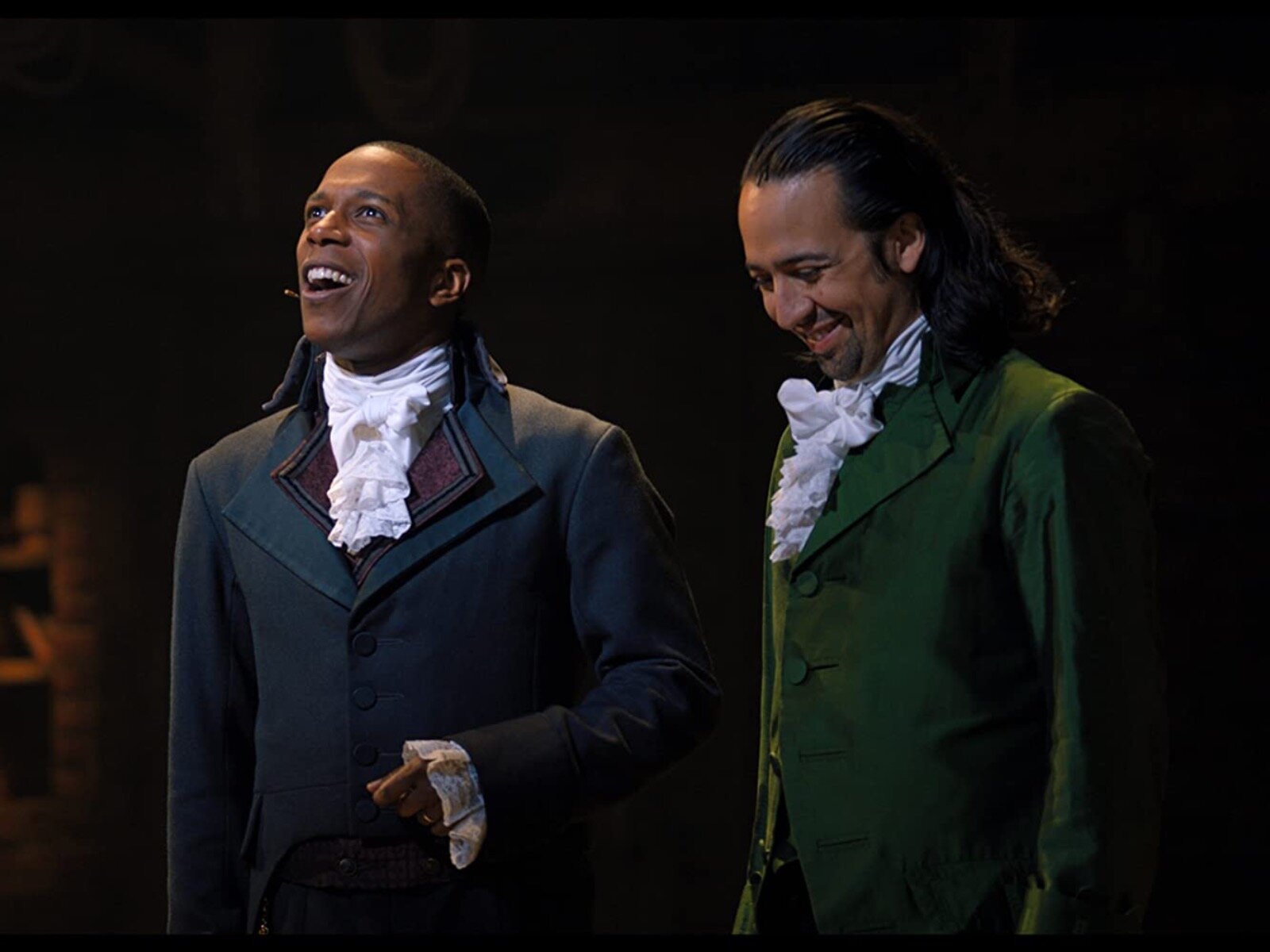When Jackie Robinson came into professional baseball in 1947, he broke the rules. There was no written rule about race in baseball, but as any fan of the game knows, unwritten laws are often the most intensely followed. But Robinson was a rebel and a fighter without throwing a single punch, and in the end, he helped make baseball America’s pastime, not just white America’s pastime.
"42," on the other hand, follows all of the rules. It delivers everything you expect from a sports biopic and everything you already knew walking in without adding much new life or perspective. The story is powerful, if not the storytelling.
Newcomer Chadwick Boseman fills the subject’s big cleats (the only other film about Robinson,"The Jackie Robinson Story," starred No. 42 himself), as he makes his climb from the Kansas City Monarchs of the Negro Leagues to the Brooklyn Dodgers of the major leagues. Before he makes the big leagues, though, he has to prove himself with the Dodgers’ farm club, the Montreal Royals.
He proves himself to be a capable hitter (his career batting average was an impressive .311) and a menace to opposing pitchers on the base paths, all while battling the racist taunts of many fans and fellow players. In the middle of one game, a police officer insists Robinson leaves the field. Later, a mob threatens to attack his house. He shakes them off, and after a year with Montreal, his tough skin and play earns him a spot on the Dodgers.
The bigger stage comes with bigger pressure and louder outcries. Teammates ask for trades, pitchers throw at him and fans boo him with opposing managers – namely Phillies manager Ben Chapman (Alan Tudyk of "Firefly" fame) – joining in with vile insults of their own. No matter. Jackie plays through, helping the Dodgers win the 1947 NL pennant and earning Rookie of the Year honors, as well as the respect of most of the nation.
Writer-director Brian Helgeland covers the legend all right; it’s the man underneath who escapes him. He wants to paint a portrait of a noble, dignified hero, but that’s all Robinson comes off as. His pains and passions, his fun side and his flawed side all get buried under the movie’s idealized, stoic and, in the end, kind of bland portrayal. The film’s episodic nature doesn’t help build much momentum either for both the character’s growth or the story (the big climactic game just kind of … happens, as though the movie shrugged and said, "let’s just stop here for the day").
We get one scene – a bat-shattering breakdown after having to take another dose of Chapman’s bigotry – that gives a glimpse into the human behind the myth. However, it gets fixed with a quick sermon from Branch Rickey (Harrison Ford), the famed Dodgers executive who gets a significant chunk of screen time as Robinson’s mentor.
Rickey ends up being a mildly problematic character in "42" and not because of Ford’s entertainingly growly performance. As written by Helgeland, he borders uncomfortably near the courageous white savior character that tends to litter films about the trials of the black American experience (see "The Blind Side"). It’s a nice screenwriter trick, reassuring white audiences that they shouldn’t feel too bad even though they are essentially the villain; in fact, white people deserve some credit for this monumental moment in black history too!
This isn’t to degrade or negate Rickey’s influential role in Robinson’s career. Rickey’s own beliefs and personal experiences in baseball made him one of the game’s leading voices for desegregation, and the script, in one of its more honest and nuanced moments, makes sure to note that bringing Jackie to the Dodgers was a calculated business move, as well.
Money isn’t black or white, Rickey notes early on, it’s green, and there was a large market of black fans untapped. That being said, the film gets dangerously close to making Robinson and his courage feel like Rickey’s creation.
"42" means well, though. Boseman does a respectable job of trying to get under Robinson’s skin where the script refuses, and Helgeland packs the film with several colorful characters, especially the team’s duo of managers, the womanizing Leo Durocher (Christopher Meloni) and his laid-back replacement, Burt Shotton (Max Gail). John C. McGinley is also consistently amusing, dropping all kinds of dry, old-school witticisms as Dodgers radioman Red Barber.
The movie does its best, however, when it’s on the diamond. As a die-hard baseball fan, there is a nostalgic rush seeing classic stadiums like Ebbets Field come to life on screen and watching the jerseys of teams from the past come off museum walls and take the field. The game action looks and feels right too. Helgeland aces the mental jousting between pitcher and base runner, and his camera excitingly nips at Robinson’s feet as he races from base to base.
Besides those on-field moments of grit, Helgeland has one go-to pitch in his arsenal: the cornball. From its wistful sepia tone to constant inspirational speeches to the young black fan in the crowd praying for Jackie to get a hit, it’s clear that when it comes to hokum, Helgeland is swinging for the fences. Unlike some baseball movies (particularly ones starring Clint Eastwood and Amy Adams released in 2012), it’s thankfully not cloying, and considering the period setting, it fits.
If anything, it just makes "42" feel obvious and simplistic. Every racist moment and ensuing triumph is hit with blunt force and underscored with swelling music. Jackie’s play or a speech or two instantly dispel racist mindsets and tensions passed on for generations. Good people are irrefutably good. Bad people are irrefutably bad, and if they don’t change, they get taught a lesson or get their comeuppance in the course of two hours. Isn’t it sweet to think so.
Helgeland delivers the story of Jackie Robinson that we’ve all come to know and imagine, and in that regard, he does a good job. It's a well-made film, and it’ll make a fine educational tool for young ones learning about Jackie Robinson and the country’s struggle with racism. But the reality and complexities of his experience are still waiting to come up to the plate.
"42": **1/2 out of ****
As much as it is a gigantic cliché to say that one has always had a passion for film, Matt Mueller has always had a passion for film. Whether it was bringing in the latest movie reviews for his first grade show-and-tell or writing film reviews for the St. Norbert College Times as a high school student, Matt is way too obsessed with movies for his own good.
When he's not writing about the latest blockbuster or talking much too glowingly about "Piranha 3D," Matt can probably be found watching literally any sport (minus cricket) or working at - get this - a local movie theater. Or watching a movie. Yeah, he's probably watching a movie.







